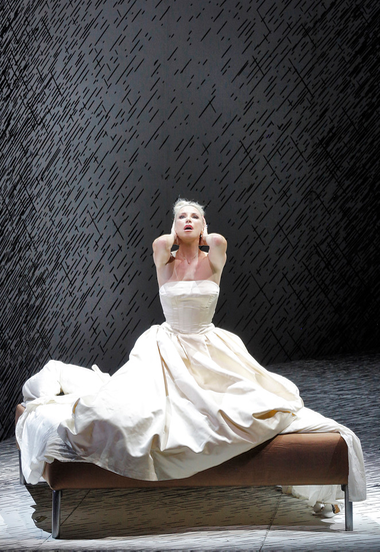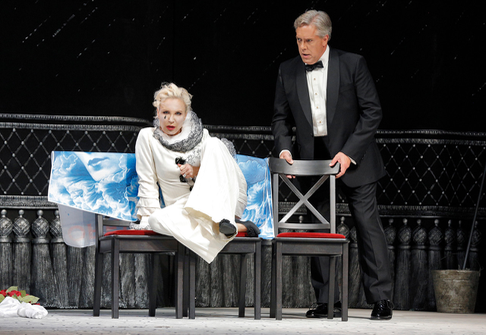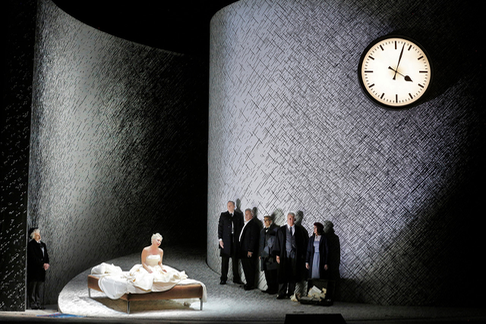
21 Oct 2016
Věc Makropulos in San Francisco
A fixation on death at San Francisco Opera. A 337 year-old woman gave it all up just now after only six years since she last gave it all up on the War Memorial stage.
English Touring Opera are delighted to announce a season of lyric monodramas to tour nationally from October to December. The season features music for solo singer and piano by Argento, Britten, Tippett and Shostakovich with a bold and inventive approach to making opera during social distancing.
This tenth of ten Live from London concerts was in fact a recorded live performance from California. It was no less enjoyable for that, and it was also uplifting to learn that this wasn’t in fact the ‘last’ LfL event that we will be able to enjoy, courtesy of VOCES8 and their fellow vocal ensembles (more below …).
Ever since Wigmore Hall announced their superb series of autumn concerts, all streamed live and available free of charge, I’d been looking forward to this song recital by Ian Bostridge and Imogen Cooper.
The Sixteen continues its exploration of Henry Purcell’s Welcome Songs for Charles II. As with Robert King’s pioneering Purcell series begun over thirty years ago for Hyperion, Harry Christophers is recording two Welcome Songs per disc.
Although Stile Antico’s programme article for their Live from London recital introduced their selection from the many treasures of the English Renaissance in the context of the theological debates and upheavals of the Tudor and Elizabethan years, their performance was more evocative of private chamber music than of public liturgy.
In February this year, Albanian soprano Ermonela Jaho made a highly lauded debut recital at Wigmore Hall - a concert which both celebrated Opera Rara’s 50th anniversary and honoured the career of the Italian soprano Rosina Storchio (1872-1945), the star of verismo who created the title roles in Leoncavallo’s La bohème and Zazà, Mascagni’s Lodoletta and Puccini’s Madama Butterfly.
Evidently, face masks don’t stifle appreciative “Bravo!”s. And, reducing audience numbers doesn’t lower the volume of such acclamations. For, the audience at Wigmore Hall gave soprano Elizabeth Llewellyn and pianist Simon Lepper a greatly deserved warm reception and hearty response following this lunchtime recital of late-Romantic song.
Collapsology. Or, perhaps we should use the French word ‘Collapsologie’ because this is a transdisciplinary idea pretty much advocated by a series of French theorists - and apparently, mostly French theorists. It in essence focuses on the imminent collapse of modern society and all its layers - a series of escalating crises on a global scale: environmental, economic, geopolitical, governmental; the list is extensive.
For this week’s Live from London vocal recital we moved from the home of VOCES8, St Anne and St Agnes in the City of London, to Kings Place, where The Sixteen - who have been associate artists at the venue for some time - presented a programme of music and words bound together by the theme of ‘reflection’.
'Such is your divine Disposation that both you excellently understand, and royally entertaine the Exercise of Musicke.’
Amongst an avalanche of new Mahler recordings appearing at the moment (Das Lied von der Erde seems to be the most favoured, with three) this 1991 Mahler Second from the 2nd Kassel MahlerFest is one of the more interesting releases.
‘And there was war in heaven: Michael and his angels fought against the dragon; and the dragon fought and his angels, And prevailed not; neither was their place found any more in heaven … that old serpent … Satan, which deceiveth the whole world: he was cast out into the earth, and his angels were cast out with him.’
If there is one myth, it seems believed by some people today, that probably needs shattering it is that post-war recordings or performances of Wagner operas were always of exceptional quality. This 1949 Hamburg Tristan und Isolde is one of those recordings - though quite who is to blame for its many problems takes quite some unearthing.
There was never any doubt that the fifth of the twelve Met Stars Live in Concert broadcasts was going to be a palpably intense and vivid event, as well as a musically stunning and theatrically enervating experience.
‘Love’ was the theme for this Live from London performance by Apollo5. Given the complexity and diversity of that human emotion, and Apollo5’s reputation for versatility and diverse repertoire, ranging from Renaissance choral music to jazz, from contemporary classical works to popular song, it was no surprise that their programme spanned 500 years and several musical styles.
The Academy of St Martin in the Fields have titled their autumn series of eight concerts - which are taking place at 5pm and 7.30pm on two Saturdays each month at their home venue in Trafalgar Square, and being filmed for streaming the following Thursday - ‘re:connect’.
The London Symphony Orchestra opened their Autumn 2020 season with a homage to Oliver Knussen, who died at the age of 66 in July 2018. The programme traced a national musical lineage through the twentieth century, from Britten to Knussen, on to Mark-Anthony Turnage, and entwining the LSO and Rattle too.
With the Live from London digital vocal festival entering the second half of the series, the festival’s host, VOCES8, returned to their home at St Annes and St Agnes in the City of London to present a sequence of ‘Choral Dances’ - vocal music inspired by dance, embracing diverse genres from the Renaissance madrigal to swing jazz.
Just a few unison string wriggles from the opening of Mozart’s overture to Le nozze di Figaro are enough to make any opera-lover perch on the edge of their seat, in excited anticipation of the drama in music to come, so there could be no other curtain-raiser for this Gala Concert at the Royal Opera House, the latest instalment from ‘their House’ to ‘our houses’.
"Before the ending of the day, creator of all things, we pray that, with your accustomed mercy, you may watch over us."

A fixation on death at San Francisco Opera. A 337 year-old woman gave it all up just now after only six years since she last gave it all up on the War Memorial stage.
Strange programming at San Francisco Opera. While these October performances of Janacek’s penultimate opera do mark the 50th anniversary of its American premiere (at SFO in November 1966) one might have wished for a change of opera — not theme. For one of many examples we might have had Janacek’s last opera — From the House of the Dead instead, a surpassing masterpiece that has yet to find its way to San Francisco.
But dismiss that thought. In many ways this seems like the first time we will have witnessed this strange Slavic comedy here in San Francisco, given a convergence of factors — notably a comedienne of such dimension that we were irrevocably and directly present at the final collapse and total disintegration of a 337 year-old woman, and, strangely, the absence of a star conductor, leaving us with the raw, unfiltered power of the Janacek orchestral specter. It was an evening of monumental art.
There will be many of us San Franciscans who recall the veritable Who’s Who of Makropulos Case personages over the past 50 years — the Paul Hager production of 1966 with the forever mourned Marie Collier (our Tosca when Maria Callas was not), the 1976 remount of the same sets but with legendary Anna Silja directed by the young David Pountney, conducted by Ernő Dohnányi, the 1993 remount of the same cloth painted sets now staged by legendary soprano Elisabeth Söderström and conducted by famed Janacek champion Charles Mackerras. Then finally in 2010 a new production. French born, Germany based director Olivier Tambosi created a vehicle for the powerhouse presence of Karita Mattila conducted by esteemed Janacek interpreter Jiří Bělohlávek.
 Nadja Michael as Emilia Marty, Stephen Powell as Baron Jaroslav Prus
Nadja Michael as Emilia Marty, Stephen Powell as Baron Jaroslav Prus
But it has taken Leipzig born, Berlin based, American educated (IU) Nadja Michael to realize the Emilia Marty (formerly Elina Makropulos et al) in deepest and truest and most vivid essence on the War Memorial stage, aided in no small way by stage director Tambosi in this remount of his turntable, solid-walled production. The lithographic scenic texture grounded the storytelling in timelessness — even with the naive, gratuitous real time clock. The concentrated playing areas forced the action into high theatrical pitch, and the lighting burned through the threads of time with maximum intensity.
Soprano Nadja Michael was one with her costumes and platinum wig, brilliant quotations from historic haute couture, teasing where high fashion crosses into theater (and cinema) and visa versa. Her costumes gave free flow to the supple physical contortions she effected, that took us to a confusion of the real with the irreal, blurring human and the supernatural. Mme. Michael possesses a strong voice and riveting presence that dissolved into moral exhaustion and the finality of her existence.
 The death of Emilia Marty, Elina Makropolus, et al
The death of Emilia Marty, Elina Makropolus, et al
But neither the men in her life nor the young singer aspiring to this artistic immortality had the size of personality or voice to illuminate much less confront the very complicated machinations of the plot. I wanted bigger, more important characters to effect the musical gestures of love and longing, hopelessness and realization that Janacek develops in all of his operas. It is possible that this pallid humanity was exaggerated by the naïveté of the conducting. Young St. Petersberg conductor Mikhail Tatarnikov permitted the primary, primitive motions of Janacek’s orchestral continuum to illuminate the diva but the maestro all but ignored the complex world in which she existed. As well, and disappointingly the young maestro did not achieve the shattering orchestral climaxes that would ordinarily cap each of the acts.
Given the conducting perhaps the supporting characters did not have a chance. Tenor Charles Workman as Berti missed the soaring climaxes of the hapless, incestuous lover, tenor Brenton Ryan, a participant in the L.A. Opera young artist program, does not yet have the chops to muster the intensity of compulsive infatuation. Joel Sorensen brought sharp brittleness to the role of the law clerk Vitek, and as well I found an unwanted caricature in the role of the aspiring singer Kristina, performed by Adler Fellow Julia Adams. As Gregor’s lawyer, Dr. Kolenaty, and Gregor’s opponent, Baron Prus, baritones Dale Travis and Stephen Powell left me wishing for more powerful voices and personages.
Nonetheless it was an exhilarating evening at San Francisco Opera.
Michael Milenski
Cast and production information:
Emilia Marty: Nadja Michael; Albert Gregor: Charles Workman; Baron Jaroslav Prus: Stephen Powell; Dr. Kolenatý; Dale Travis; Vitek: Joel Sorensen; Kristina: Julie Adams;
Count Hauk-Sendorf: Matthew O’Neill; Janek: Brenton Ryan; A Cleaning Woman/A Chambermaid: Zanda Svede; A Stagehand: Brad Walker. Chorus and orchestra of the San Francisco Opera. Conductor: Mikhail Tatarnikov; Stage Director: Olivier Tambosi;
Production Designer: Frank Philipp Schlössmann; Lighting Designer: Duane Schuler. War Memorial Opera House, October 18, 2016.